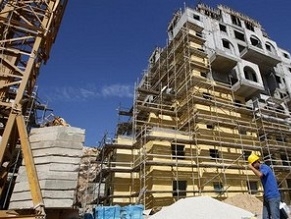|
World Jewish News

Modi'in Illit construction site [file]. Photo: REUTERS/Gil Cohen Magen
|
Judea and Samaria Higher Planning Council to debate construction of 1,071 settler homes
17.07.2013, Israel and the World The Higher Planning Council for Judea and Samaria is set to debate the advancement of plans for 1,072 new homes in West Bank settlements on Wednesday.
The debate comes as US Secretary of State John Kerry is in Jordan, where he will hold talks on the frozen Israeli-Palestinian peace process with the Arab League.
According to the council’s agenda, it will debate a plan for 732 new homes in the Modi’in Illit settlement, located on the pre-1967 lines.
The council also plans to discuss building plans for 10 other settlements, but according to the office of the Coordinator of Government Activities in the Territories, the schedule is subject to change.
According to Peace Now, the council also plans to discuss plans for building 234 units in Galgal and 31 homes in Almog, both settlements located in the Jordan Valley. It will also examine plans for 38 homes for Kochav Ya’akov and 17 for Shiloh, settlements in the Binyamin Region.
In addition it will consider plans for 19 homes in Kfar Adumim, located outside of the Ma’aleh Adumim settlement, on the way down to the Dead Sea from Jerusalem.
A de facto freeze on the publication of housing tenders in West Bank settlements and east Jerusalem has been in place since January, as an Israeli gesture to help foster a conducive climate for the renewal of talks with the Palestinians, which have been largely frozen since December 2008.
The Palestinians have insisted that Israel must halt all settlement activity as a precondition for the resumption of talks.
Israel has refused to cede to that request and has insisted that talks must be held without pre-conditions.
In particular, the Higher Planning Council has continued to debate and advance plans for thousands of new homes in West Bank settlements in the last six months.
By TOVAH LAZAROFF
JPost.com
|
|
